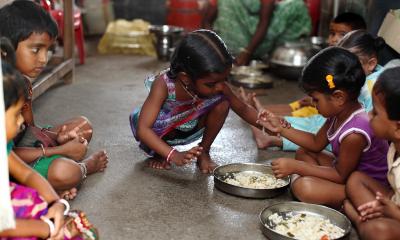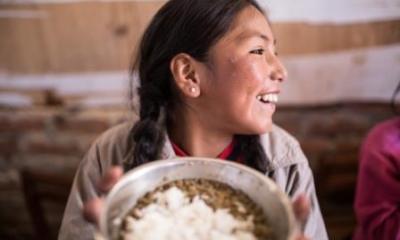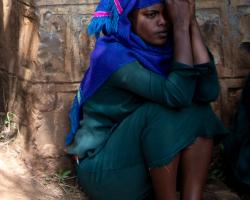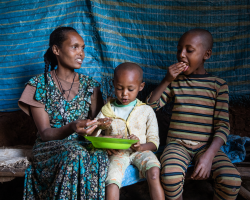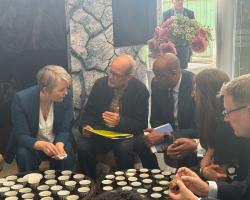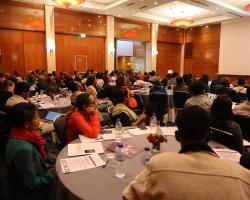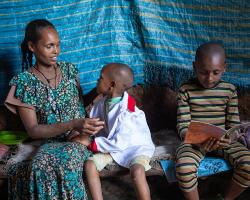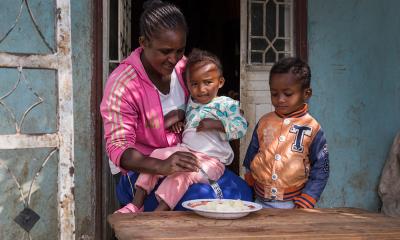
Ethiopia had made good progress towards the Millennium Development Goals, compared to other Sub-Saharan countries, and is now working hard to meet the Sustainable Development Goals. In addition to an overall decline in poverty, and reductions in child mortality and the prevalence of HIV and AIDS, economic growth over the past two decades has brought an expansion of infrastructure and improved access to services such as health and education. However, multiple shocks including Covid, drought and climate change, conflict, inflation, and recently the floating of the currency leading to depreciation, have been affecting livelihoods and increased the importance of humanitarian assistance and safety nets.
Moreover, food security and under-nutrition persist. According to the June 2024 United Nations Office for the Coordination of Humanitarian Affairs (OCHA) report, 21.4 million people are in need overall and 15.8 million require food aid.
There are signs that gains are being reversed and inequalities are beginning to widen, particularly between urban and rural areas, and the extent of impacts of earlier and ongoing conflict on the economy and the recent economic reforms on livelihoods remains to be seen.
Visit the Young Lives Ethiopia website to learn more, including the effects of COVID-19, conflict and climate change.

Our study sites in Ethiopia are spread across 7 regions – Amhara, Oromia, Central Ethiopia Regional State, Sidama, Southern Nations Nationalities and Peoples Region, Tigray and Addis Ababa. Our findings on health and nutrition are providing a positive message about the potential of catch-up growth for malnourished children, and the Ethiopian government has recently set up a school-feeding programme. The unique dual cohort design of Young Lives means that we are in a good position to provide evidence on the quality of education throughout the school system. We have provided evidence on how the government should best implement its ambitious plans to expand early learning. As we follow our cohorts, into young adulthood, with the younger cohort aged 22-23 and the older cohort aged 29-30, our research shows the vital importance of expanding education and employment opportunities and how best to support transitions to adulthood. Read about the calls here. We completed the 7th round survey in April 2024 and will be sharing preliminary fact sheets soon. Read a summary of Young Lives' work in Ethiopia via the button below.
Ethiopia had made good progress towards the Millennium Development Goals, compared to other Sub-Saharan countries, and is now working hard to meet the Sustainable Development Goals. In addition to an overall decline in poverty, and reductions in child mortality and the prevalence of HIV and AIDS, economic growth over the past two decades has brought an expansion of infrastructure and improved access to services such as health and education. However, multiple shocks including Covid, drought and climate change, conflict, inflation, and recently the floating of the currency leading to depreciation, have been affecting livelihoods and increased the importance of humanitarian assistance and safety nets.
Moreover, food security and under-nutrition persist. According to the June 2024 United Nations Office for the Coordination of Humanitarian Affairs (OCHA) report, 21.4 million people are in need overall and 15.8 million require food aid.
There are signs that gains are being reversed and inequalities are beginning to widen, particularly between urban and rural areas, and the extent of impacts of earlier and ongoing conflict on the economy and the recent economic reforms on livelihoods remains to be seen.
Visit the Young Lives Ethiopia website to learn more, including the effects of COVID-19, conflict and climate change.

Our study sites in Ethiopia are spread across 7 regions – Amhara, Oromia, Central Ethiopia Regional State, Sidama, Southern Nations Nationalities and Peoples Region, Tigray and Addis Ababa. Our findings on health and nutrition are providing a positive message about the potential of catch-up growth for malnourished children, and the Ethiopian government has recently set up a school-feeding programme. The unique dual cohort design of Young Lives means that we are in a good position to provide evidence on the quality of education throughout the school system. We have provided evidence on how the government should best implement its ambitious plans to expand early learning. As we follow our cohorts, into young adulthood, with the younger cohort aged 22-23 and the older cohort aged 29-30, our research shows the vital importance of expanding education and employment opportunities and how best to support transitions to adulthood. Read about the calls here. We completed the 7th round survey in April 2024 and will be sharing preliminary fact sheets soon. Read a summary of Young Lives' work in Ethiopia via the button below.



